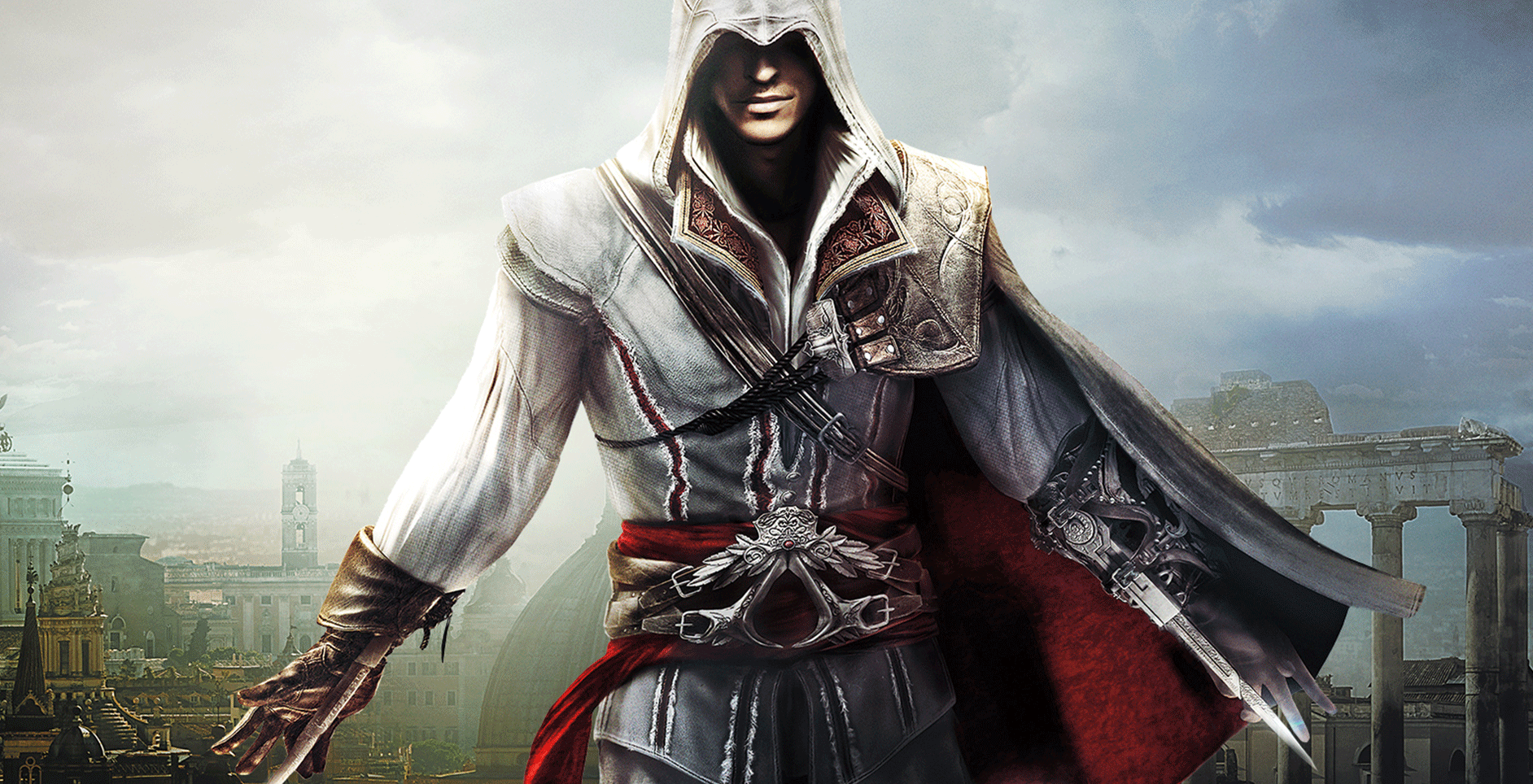Assassin’s Creed has been a franchise that has been in constant flux. When Ubisoft released Assassin’s Creed II, many fans were enamoured with Ezio’s charm and wit, amongst other things. Not content with letting this character suffer the same fate as relatively underplayed Altair, Ubisoft made him the focus of the next two games, Brotherhood and Revelation. And while the pages have since turned on Ezio’s time in the series, Ubisoft have been trying so desperately scramble to create a character as appealing, as cheeky and as popular as Ezio. It makes sense then, given the characters become a poster boy for the franchise, to choose the games he features in when selecting from Assassin’s Creed’s very storied history. Assassin’s Creed: The Ezio Collection is that collection.
Assassin’s Creed: The Ezio Collection includes Assassin’s Creed II, Assassin’s Creed: Brotherhood and Assassin’s Creed: Revelations with all their respective downloadable add-ons. While the quality of the downloadable content is inconsistent, there’s still a lot of content on here for a rather reasonable asking price. Each game focuses largely on Ezio Auditore da Firenze, the most popular assassin in the franchise. And while all three games are included, only the single player components are, the series’ surprisingly solid multiplayer is completely absent.
But there are also some residual storylines that follow characters like Desmond Miles and Altair Ibn-La’Ahad. The short film, Embers, which concludes Ezio’s story is also included. The Ezio Collection makes sense here as it chronicles Ezio’s life from beginning to end, but those who aren’t well versed in the Assassin’s Creed universe will play these and be either disappointed or confused that there’s not even video packages to sum up the storylines that are dropped or concluded in other games not included in this collection. It’s admittedly a small and minor issue but one that’s worth mentioning.

Without a doubt the resounding question mark above projects like the Ezio Collection is just how necessary they are. The oldest game in this franchise came out in 2009, which isn’t all that long ago. But despite that, there have been some efforts to get these games looking their best (or at least, better than their original presentation). But as with any collection the strength of the collection is only as strong as the games and the Assassin’s Creed games are somewhat inconsistent.
Assassin’s Creed II is the game that arguably put the series on the map and grew its audience phenomenally, but it’s easily the game here that time has been least kind to. Rather amusingly, it introduced us to the more polished concept of an Ubisoft open world game, and at the time I thought it was a gameplay loop I would never get bored of. But despite Assassin’s Creed II’s stunning locales and the fact it introduced us to Assassin’s Creed as we know and love it today, it’s the game I least want to revisit as many improvements including to climbing and combat are just not there yet.
Assassin’s Creed: Brotherhood is arguably one of the highest points in the franchise. Taking place in just Rome, Brotherhood is free to focus on improving everything else. Combat options are more numerous; platforming segments are better designed and Ezio can now call upon his own Assassin’s to do the dirty work for him. Brotherhood felt like an expansion to II at the time of release but today it just feels like a more intriguing, better focused follow-up. There’s just a lot more to do and a lot more variety in Brotherhood which was important given the single location the game takes place in.

The final game in the collection, Assassin’s Creed: Revelations is not remembered anywhere near as fondly as Assassin’s Creed II and Brotherhood but is a personal favourite of mine. While it was the Assassin’s Creed game that started to introduce minor elements of franchise fatigue, it did a fantastic job at wrapping up not only the story of Ezio himself but also Altair. Even more fittingly, the game took place largely in Constantinople / Istanbul which is one of the most beautiful locales the series has ever visited. Revelation was perhaps more divisive because of how obviously outsourced it was – so many different elements and gameplay styles were crammed into a single game – which lead to some issues with consistency. Overall, though, Revelations is a fitting and very satisfying end to Ezio and Altair’s story and yet another solid but familiar Assassin’s Creed game.
From a presentation standpoint, not a whole lot has been done to these games on a visual level beyond the bare minimum, which is a little bit disappointing. But what the Ezio Collection brings to each game depends on how good the work was on the game in the first place. To be blunt – the games that looked better originally look even better now. This is just a collection of ports with fancy post processing effects. The result is quite variable depending on which game you’re playing.

Assassin’s Creed II is easily the worst looking of the three but also the oldest. A running theme with the Ezio Collection, the visuals are clearly being rendered at a higher resolution to improve the overall image quality but textures and models have not received any touch ups. The result is cleaner character models that have a strange look to them. Kristen Bell’s character Lucy now looks like she’s permanently surprised with a clean face and wide open eyes. Some guards in the background look like they’ve just seen a ghost. Everyone looks like they’ve had bad cosmetic surgery in Assassin’s Creed II and it’s a shame.
Brotherhood and Revelations are much better looking games in the package. Brotherhood, as a whole, is much more refined looking than Assassin’s Creed II. The models have clearly been touched up since its predecessor which results in not only a cleaner looking image but a more comfortable one filled with characters who aren’t dead inside. Revelations completely redid most of the facial modelling and animations, and thus looks the best of the three. Similarly, the world of Revelations is much more detailed and dense so the bump in resolution is much more noticeable.
CONCLUSION
Assassin’s Creed: The Ezio Collection is largely that, just a collection of games. There are little additions to the package to the point where it’s hard to call it a remaster. These games have been enhanced to take advantage of the hardware they’re running on – character models are cleaner (sometimes for better or for worse) and the lighting has been improved to offer more realistic cityscapes. But the whole thing doesn’t feel like there’s as much effort gone into it as much as previous collections and remasters. Ergo, a bump in resolution is great but without improving other aspects it can work to the game’s detriment. But this is more or less only applicable to Assassin’s Creed II.
But regardless of what you think about the quality or effort put into this remaster, the underlying games that inhabit Ezio Collection are still very solid games, with a lot of great content to plough through for a reasonable asking price. It’s just a little bit of a shame that these don’t have the wow factor that improved models or even 60fps might have brought. Still, an improvement is an improvement, if only slight.
The Xbox One version of this game was primarily used for the purpose of testing.



